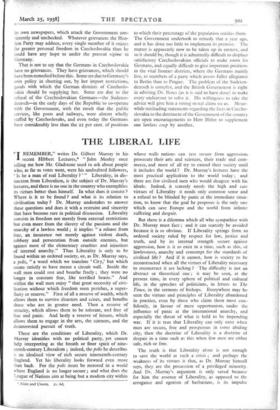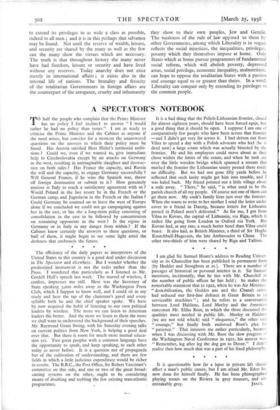THE LIBERAL LIFE
"I REMEMBER," writes Dr. Gilbert Murray in his recent Hibbert Lectures,* " John Morley once telling me how Mr. Gladstone used to ask about people who, as far as votes went, were his undoubted followers, ' Is he a man of real Liberality ? " Liberality, in dis- tinction from Liberalism, is the subject of Dr. Murray's lectures, and there is no one in the country who exemplifies its virtues better than himself. In what does it consist ? Where is it to be found ? and what is its relation to civilisation today ? Dr. Murray undertakes to answer these questions and does it with a restraint and sincerity that have become rare in political discussion. Liberality consists in freedom not merely from external restrictions but even more from the slavery of the passions and the anarchy of a lawless world ; it implies " a release from fear, an insurance not merely against violent death, robbery and persecution from outside enemies, but against most of the elementary cruelties and injustices of internal anarchy." Thus Liberality is only to be found within an ordered society, or, as Dr. Murray says, a polls, " a word which we translate ' Cit y,' but which seems strictly to have meant a circuit wall. Inside the wall men could rest and breathe freely ; they were no longer in constant fear, like terrified beasts." And within the wall men enjoy " that great necessity of civi- lisation without which freedom soon perishes, a super- fluity or reserve." First of all a reserve of wealth, which allows than to survive disasters and crises, and benefits those who are in greater need. Then a reserve of security, which allows them to be tolerant, and free of fear and panic. And lastly a reserve of leisure, which allows them to engage in the arts, the sciences, and the disinterested pursuit of truth.
These are the conditions of Liberality, which Dr. Murray identifies with no political party, yet cannot help interpreting as the breath or finer spirit of nine- teenth-century Liberalism ; indeed, the polls he describes is an idealised view of rich secure nineteenth-century England. Yet his liberality looks forward even mere than back. For the polls must be restored in a world where England is no longer secure ; and what does the League of Nations aim at being but a modem city within
* Allen and Unwin. 2s. 6d.
whose walls nations can rest secure from aggression, prosecute their arts and sciences, their trade and com- merce, and most of all try to extend their society until it includes the world ? Dr. Murray's lectures have the most practical application to the world today ; and there are few civilised men who would disagree with his ideals. Indeed, it scarcely needs the high and rare virtues of Liberality it needs only common sense and a refusal to be blinded by panic at the immediate situa- tion, to know that the goal he proposes is the only one which can save Europe and the world from infinite suffering and despair.
But there is a dilemma which all who sympathise with Dr. Murray must face ; and it can scarcely be avoided because it is so obvious. If Liberality springs from an ordered society ruled by respect for law, justice and truth, and by its internal strength secure against aggression, how is it to exist in a time, such as this, of lawlessness, anarchy and contempt for the standards of civilised life ? And if it cannot, how is society to be reconstructed when all the virtues of Liberality necessary to reconstruct it are lacking ? The difficulty is not an abstract or theoretical one ; it may be seen, at the present time, in every sphere of political and cultural life, in the speeches of politicians, in letters to The Times, in the sermons of bishops. Everywhere may be seen the virtues and principles of Liberality abandoned in practice, even by those who claim them most con- fidently, in favour of mere opportunism, under the influence of panic at the international anarchy, and especially the threat of what is held to be impending war. If it is true that Liberality can only exist when men are secure, free and prosperous in some abiding city, then the doctrine of Liberality is a doctrine of despair in a time such as this when few men are either safe, rich or free.
The truth is that Liberality alone is not enough to save the world at such a crisis ; and. perhaps the weakness of its virtues is that, as Dr. Murray himself says, they are the possession of a privileged minority. And Dr. Murray's argument is only saved because for him the essence of Liberality, as opposed to the arrogance and egotism of barbarians, is its impulse to extend its privileges to as wide a class as possible, indeed to all men and it is in this perhaps that, salvation may be found. Not until the reserve of wealth, leisure, and security are shared by the many as well as the few can the many show the virtues which are necessary. The truth is that throughout history the many never have had freedom, leisure or security and have lived without any reserves. Today anarchy does not exist merely in international affairs ; it exists also in the internal life of nations. The brutality and ferocity of the totalitarian Governments in foreign affairs are the counterpart of the arrogance, cruelty and inhumanity they show to their own peoples, Jew and Gentile. The 'weakness of the rule of.law opposed to them by other Governments, among which Liberality is in vogue, reflects the social injustices, the inequalities, privileges, poverty which they themselves impose at home. Only States which at home pursue programmes of fundamental social reform, which will abolish poverty, -depressed areas, social privilege, economic inequality, malnutrition, can hope to oppose the totalitarian States with a passion and courage equal to or greater than theirs. In a word, Liberality can conquer only by extending its privileges to the common people.











































































 Previous page
Previous page